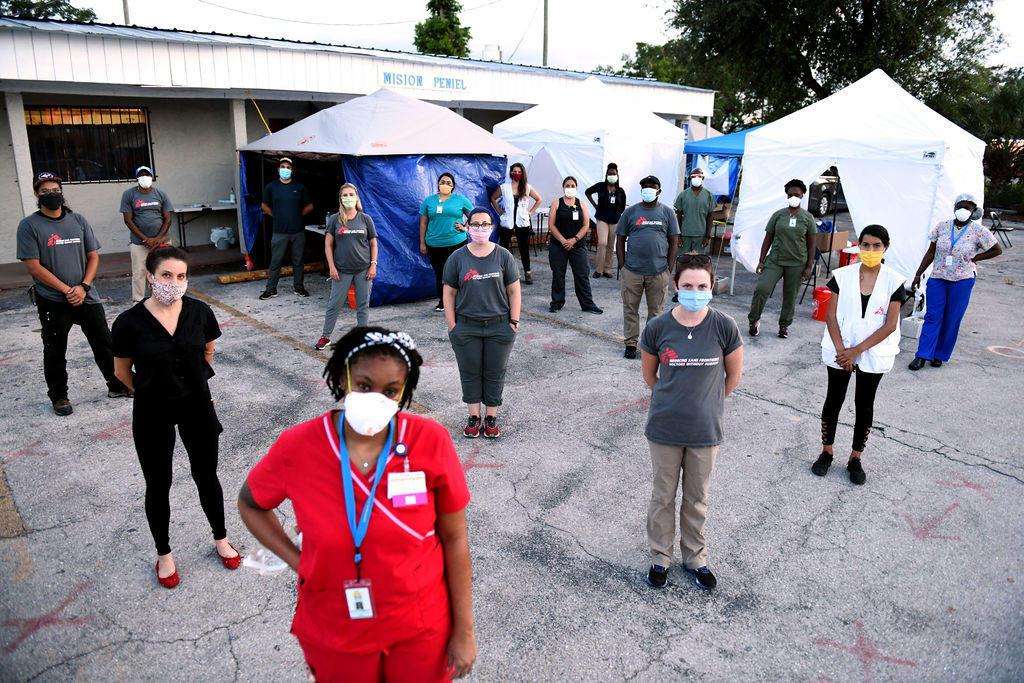Immokalee, Florida, June 26, 2020—Doctors Without Borders/Médecins Sans Frontières (MSF) has completed the handover of its COVID-19 testing and public health program for farmworkers in Immokalee, Florida, to the county health department and local organizations.
The international medical humanitarian organization spent two months in Immokalee, where an estimated 15,000-20,000 migrant farmworkers continued to work during the pandemic with minimal access to health care and testing. Beginning in early May, MSF ran a public health education campaign and mobile testing clinics in collaboration with the Coalition of Immokalee Workers (CIW), the Healthcare Network of Southwest Florida, and the Collier County Department of Health.
In recent weeks, increased attention on the high rate of COVID-19 transmission in farmworker communities in Florida has led to increased testing efforts by county and state officials. When MSF first arrived in late April open testing was only available three days a week—an immense barrier for farmworkers who work long hours, up to six or seven days per week. Open testing is now available six days per week, including three days of testing on evenings, and weekends.
“Over the past month we’ve seen a dramatic increase in testing efforts and in capacity for testing in Immokalee,” said Susan Doyle, MSF project coordinator in Immokalee. “We’ve also seen an isolation center open and additional capacity of actors responding to COVID-19.”
In collaboration with local actors, MSF set up testing clinics after farm working hours and on weekends and had Spanish and Creole speakers on staff to try to remove some of the barriers preventing people from accessing information, testing, and care.
“Through our program, MSF demonstrated the importance of testing at more accessible hours and in preferred languages to reach vulnerable communities,” said Jean Stowell, head of MSF’s US COVID-19 response. “We trust that county officials will continue to incorporate this approach to local testing efforts moving forward. It is imperative to ensure that high-risk communities such as farmworkers and other essential workers are not forgotten in the public health response to COVID-19.”
Working with local partners and targeting high-risk communities, MSF ran 12 pop-up testing clinics and helped to administer 465 COVID-19 tests over six weeks. As of June 2, 36 percent of those tests were positive. By comparison, as of that same week, the state positivity rate was 5.6 percent.
“Testing results confirmed that there is a high level of community transmission in the area,” said Stowell. “These results were not entirely unexpected given the specific work and housing conditions that make farmworkers so vulnerable to COVID-19. Local human rights and health organizations had been calling for more attention and testing in these communities for months. But there is a continued need in farmworker communities, both in Immokalee and throughout the US, for sustained and accessible testing, contact tracing, and safe places for people who are sick or exposed to isolate.”
MSF also conducted public health activities to promote healthy behavior and social distancing and free tablet-based telemedicine consultations for unmet general medical issues in private kiosks as part of the mobile clinics.
“There are so many rumors and so much misinformation out there about this virus,” said Maria Plata, health promoter with MSF. “People are understandably scared and want to know how to best stay safe and what to expect if they get sick. We were able to give them that information in a safe environment.”
MSF first learned of the concerning situation in Immokalee after being contacted by the CIW—a human rights organization with a long history working in the community—which requested remote technical infection control guidance. Since the start of the outbreak, CIW has continued to advocate for specific public health interventions and policies to control the outbreak and reduce community transmission, such as increased access to free COVID-19 testing, affordable health care, and isolation facilities.
At the end of April, MSF sent an assessment team to Immokalee and quickly realized that health education and testing activities needed to be ramped up immediately.
As Florida’s stay at home orders have been lifted and cases start to climb throughout the state in non-agricultural areas, it is critical that county officials continue mass testing and other important public health efforts in Immokalee. MSF stresses the importance of continued access to testing for all community members at convenient times, locations, and in their preferred languages, the need for an accessible-entry process for use of the new isolation center in Immokalee, and quality contact tracing to efficiently identify people who may have contracted the virus.
“In order to control further spread of COVID-19 in Immokalee and in vulnerable farmworker communities all over the country, local health officials need to continue to focus on people who are at heightened risk and make it as easy as possible for them to access testing, information, isolation facilities, and care,” said Doyle. “These very basic public health efforts are the only ways to break the chains of transmission, stop this outbreak and keep people safe.”




